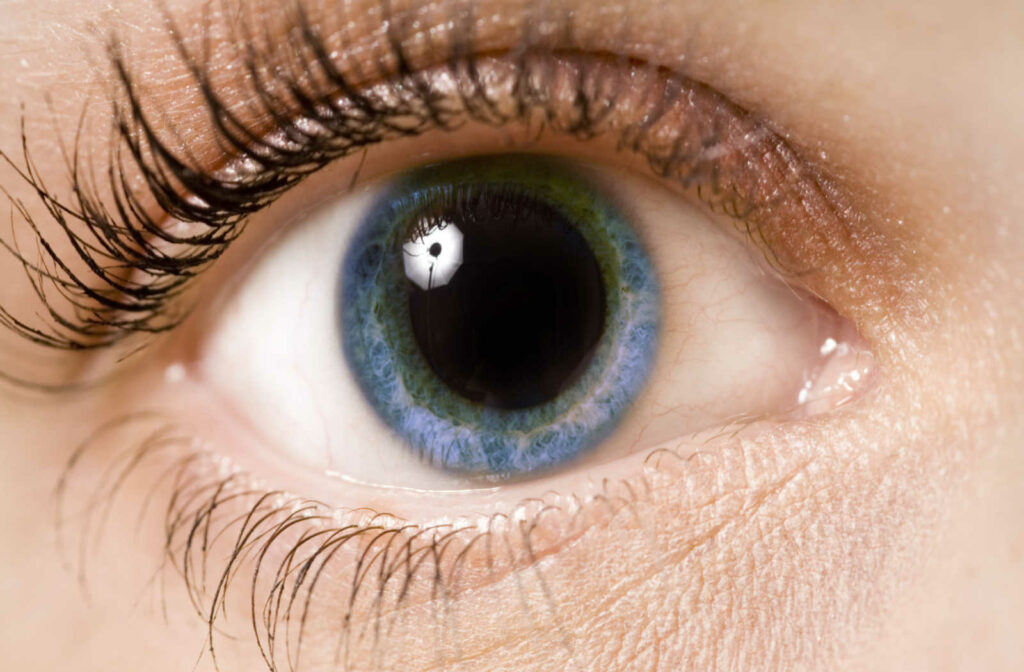We have all felt the stress of a looming deadline or exam in the future. Stress is often something that we try to avoid in our lives because of how it can affect us physically. But did you know stress can also affect your vision?
Healthy vision always starts with a routine eye exam. Your optometrist can address any unexpected or sudden stress-related vision problems and diagnose the cause of your vision changes.
Let’s look at some vision changes, blurred vision in particular, and how it’s related to stress.
Blurred Vision
What is blurry vision, and what causes it? Blurry vision is when you need to squint, blink, or rub your eyes to get a clearer view of something. Blurry vision can result from any part of the eye, including the cornea, retina, and optic nerve.
Besides refractive errors, other causes of blurry vision include:
- Eye conditions
- Stroke
- Concussion
- Eye infections
- Eye strain
- High blood sugar
- High blood pressure
- Migraine
Stress
Stress can occur in any area of your life. It’s everywhere. While some stress is beneficial, too much can affect you physically and mentally.
Stress is your body’s response to a perceived threat. Your brain releases a stress hormone called cortisol which initiates the ‘fight-or-flight’ response.
Stress can affect emotional and physical health, cognitive abilities, and behavioral changes. Changes and symptoms include:
- Increase in heart rate
- A rise in blood pressure
- Tense muscles
- Rapid breathing

Link Between Stress and Blurry Vision
Blurry vision due to stress can occur in both eyes, one eye, randomly, or more frequently with chronic stress and during panic or anxiety-related attacks. With chronic stress and long-term activation of the stress response system, cortisol and adrenaline disrupt processes in the body, possibly causing vision problems.
Pupil Dilation
The release of adrenaline, also known as the ‘fight or flight hormone,’ initiates various physiological changes, including dilating the pupils. The goal is to increase light flow into the eyes for better vision and to detect a threat.
With continued stress and subsequent release of adrenaline, dilated pupils lead to stress-related vision problems such as eventual light sensitivity, tightening of eye muscles, eye discomfort, and blurred vision.
Another negative impact of adrenaline is it can cause pressure to build up in the back of the eye leading to blurred or tunnel vision and a feeling of dizziness.
Hyperventilation
Hyperventilation or over-breathing is when you take faster breaths. People normally hyperventilate when they are stressed or anxious.
When you exhale more than you inhale, it upsets the balance of oxygen and carbon dioxide in the body. Less carbon dioxide narrows the blood vessels and blood supply to the brain. Symptoms related to hyperventilation include vision changes such as blurred vision or tunnel vision.
Inability to Focus
Increased stress levels from work or school can impact your vision through eye strain, blurry vision, and inability to focus. Also, when stressed, some people tend to move faster than they usually would, making it harder to focus on their environment and triggering the perception of blurred vision.
Basic Needs Deprivation
In some people, stress or anxiety may change behavior and their ability to oversee basic needs and thus affect their health. It can be a lack of motivation to prepare and eat nutritious food or drink enough water. A result can be dehydration which is a cause of blurred vision.
Health Conditions
Chronic stress increases your risk for high blood pressure. Prolonged high blood pressure thickens blood vessels, narrowing them and restricting blood flow to the retina. This condition is called hypertensive retinopathy.
High blood pressure levels can result from a stressful lifestyle where symptoms include double vision and blurred or reduced vision.
The eye is an extension of the brain, so when stress affects the brain, it also affects the eyes and the vascular system with stress hormone release that can directly impact vision. Study results conclude that mental stress causes different visual diseases.
Stress increases your risk of vision loss which causes more stress which worsens vision loss, and the spiral continues. Conditions associated with stress and vision loss:
Preserve Your Vision
Stress causes stress-related vision problems and is a consequence of vision loss. Symptoms of chronic stress can include eye strain, blurred vision, and other signs.
We now know that blurry vision can be a symptom of stress and other eye conditions. If you notice blurry vision or changes in your vision, contact Pack & Bianes Vision Care Optometry immediately to evaluate your visual health.



